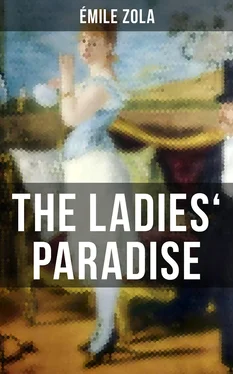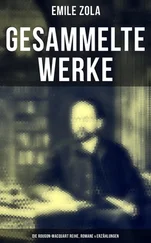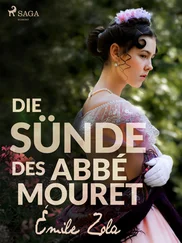“How stunning they are!” murmured Jean, finding no other words to express his emotion.
This time he himself had become motionless, his mouth open. All this female luxury turned him rosy with pleasure. He had a girl’s beauty—a beauty he seemed to have stolen from his sister—a lovely skin, curly hair, lips and eyes overflowing with tenderness. By his side Denise, in her astonishment, appeared thinner still, with her rather long face and large mouth, fading complexion, and light hair. Pépé, also fair, in the way of most children, clung closer to her, as if wanting to be caressed, troubled and delighted at the sight of the beautiful ladies in the window. They looked so strange, so charming, on the pavement, those three fair ones, poorly dressed in black—the sad-looking young girl between the pretty child and the handsome youth—that the passers-by looked back smilingly.
For several minutes a stout man with grey hair and a large yellow face, standing at a shop-door on the other side of the street, had been looking at them. He was standing there with bloodshot eyes and contracted mouth, beside himself with rage at the display made by The Ladies’ Paradise, when the sight of the young girl and her brothers completed his exasperation. What were those three simpletons doing there, gaping in front of the cheapjack’s parade?
“What about uncle?” asked Denise, suddenly, as if just waking up.
“We are in the Hue de la Michodière,” said Jean. “He must live somewhere about here.”
They raised their heads and looked round. Just in front of them, above the stout man, they perceived a green sign-board bearing in yellow letters, discolored by the rain: “The Old Elbeuf. Cloths, Flannels. Baudu, late Hauchecorne.” The house, coated with an ancient rusty whitewash, quite flat and unadorned, amidst the mansions in the Louis XIV. style which surrounded it, had only three front windows, and these windows, square, without shutters, were simply ornamented by a handrail and two iron bars in the form of a cross. But amidst all this nudity, what struck Denise the most, her eyes full of the light airy windows at The Ladies’ Paradise, was the ground-floor shop, crushed by the ceiling, surmounted by a very low storey with half-moon windows, of a prison-like appearance. The wainscoting, of a bottle-green hue, which time had tinted with ochre and bitumen, encircled, right and left, two deep windows, black and dusty, in which the heaped up goods could hardly be seen. The open door seemed to lead into the darkness and dampness of a cellar.
“That’s the house,” said Jean.
“Well, we must go in,” declared Denise. “Come on, Pépé.”
They appeared, however, somewhat troubled, as if seized with fear. When their father died, carried off by the same fever which had, a month previous, killed their mother, their uncle Baudu, in the emotion which followed this double mourning, had written to Denise, assuring her there would always be a place for her in his house whenever she would like to come to Paris. But this was nearly a year ago, and the young girl was now sorry to have left Valognes in a moment of temper without informing her uncle. The latter did not know them, never having set foot in Valognes since the day he left, as a boy, to enter as junior in the drapery establishment kept by Hauchecorne, whose daughter he afterwards married.
“Monsieur Baudu?” asked Denise, deciding at last to speak to the stout man who was still eyeing them, surprised at their appearance.
“That’s me,” replied he.
Denise blushed and stammered out: “Oh, I’m so pleased! I am Denise. This is Jean, and this is Pépé. You see we have come, uncle.”
Baudu seemed amazed. His big eyes rolled in his yellow face; he spoke slowly and with difficulty. He was evidently far from thinking of this family which suddenly dropped down on him.
“What—what, you here?” repeated he several times. “But you were at Valognes. Why aren’t you at Valognes?”
With her sweet but rather faltering voice she then explained that since the death of her father, who had spent everything in his dye-works, she had acted as a mother to the two children, but the little she earned at Cornaille’s did not suffice to keep the three of them. Jean worked at a cabinetmaker’s, a repairer of old furniture, but didn’t earn a sou. However, he had got to like the business, and had learned to carve in wood very well. One day, having found a piece of ivory, he amused himself by carving a head, which a gentleman staying in the town had seen and admired, and it was this gentleman who had persuaded them to leave Valognes, promising to find a place in Paris for Jean with an ivory-carver.
“So you see, uncle,” continued Denise, “Jean will commence his apprenticeship at his new master’s tomorrow. They ask no premium, and will board and lodge him. I felt sure Pépé and I could manage very well. We can’t be worse off than we were at Valognes.”
She said nothing about Jean’s love affair, of certain letters written to the daughter of a nobleman living in the town, of kisses exchanged over a wall—in fact, quite a scandal which had determined her leaving. And she was especially anxious to be in Paris, to be able to look after her brother, feeling quite a mother’s tender anxiety for this gay and handsome youth, whom all the women adored. Uncle Baudu couldn’t get over it, and continued his questions. However, when he heard her speaking of her brothers in this way he became much kinder.
“So your father has left you nothing,” said he. “I certainly thought there was still something left. Ah! how many times did I write advising him not to take that dye-work! A good-hearted fellow, but no head for business! And you’ve been obliged to keep and look after these two youngsters since?”
His bilious face had become clearer, his eyes were not so bloodshot as when he was glaring at The Ladies’ Paradise. Suddenly he noticed that he was blocking up the doorway.
“Well,” said he, “come in, now you’re here. Come in, no use hanging about gaping at a parcel of rubbish.”
And after having darted a last look of anger at The Ladies’ Paradise, he made way for the children by entering the shop and calling his wife and daughter.
“Elizabeth, Geneviève, come down; here’s company for you!”
But Denise and the two boys hesitated before the darkness of the shop. Blinded by the clear light of the street, they could hardly see. Feeling their way with their feet with an instinctive fear of encountering some treacherous step, and clinging still closer together from this vague fear, the child continuing to hold the young girl’s skirts, and the big boy behind, they made their entry with a smiling, anxious grace. The clear morning light described the dark profile of their mourning clothes; an oblique ray of sunshine gilded their fair hair.
“Come in, come in,” repeated Baudu.
In a few brief sentences he explained the matter to his wife and daughter. The first was a little woman, eaten up with anaemia, quite white—white hair, white eyes, white lips. Geneviève, in whom her mother’s degenerateness appeared stronger still, had the debilitated, colorless appearance of a plant reared in the shade. However, her magnificent black hair, thick and heavy, marvellously vigorous for such a weak, poor soil, gave her a sad charm.
“Come in,” said both the women in their turn; “you are welcome.”
And they made Denise sit down behind a counter. Pépé immediately jumped up on his sister’s lap, whilst Jean leant against some woodwork beside her. Looking round the shop the new-comers began to take courage, their eyes getting used to the obscurity. Now they could see it, with its low and smoky ceiling, oaken counters bright with use, and old-fashioned drawers with strong iron fittings. Bales of goods reached to the beams above; the smell of linen and dyed stuffs—a sharp chemical smell—seemed intensified by the humidity of the floor. At the further end two young men and a young woman were putting away pieces of white flannel.
Читать дальше












